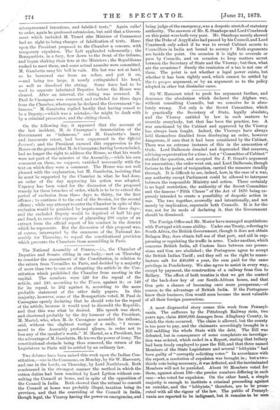Sir W. Harcourt tried to push his argument further, and
denounce the absolutism which declared the Afghan war, without consulting Councils, but we conceive he is abso- lutely wrong. Not only is the Secret Committee, which is practically the Secretary of State, legally absolute,. and the Viceroy entitled by law in such matters to override everybody, but that has been the practice, too. A war sanctioned by the Cabinet and approved by the Viceroy has always been fought. Indeed, the Viceroys have always held themselves disabled from disobeying an order, however dangerous, if sure that it had been considered by the Cabinet. There was an extreme instance of this in the annexation of Oude. Lord Dalhousie dreaded and deprecated that measure,. advising sequestration for a time ; but a " Committee of Cabinet" studied the question, and accepted Sir J. P. Grant's argument for annexation ; the order went out, and Lord Dalhousie, though furious to the point of resignation, carried the measure steadily through. It is difficult to see, indeed, how, in the case of a war, any authority except Parliament could be allowed to interpose between the responsible Ministry and action. There certainly is no legal restriction, the authority of the Secret Committee and the famous "Fifth Clause" of the Act of 1870 being ex- pressly intended to create a possibility of despotic action in war. The two together, avowedly and intentionally, and not merely by implication, supersede both Councils. It is for the war, not for its mode of declaring it, that the Government should be dismissed.


































 Previous page
Previous page